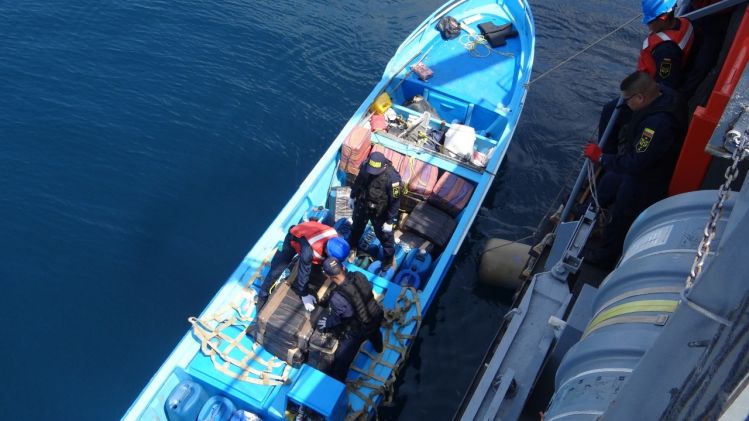Interagency forces seized more than 2 tons of cocaine off Colombia’s Pacific coast.
In two combined operations, Colombia, Panama, and the United States seized more than 2 tons of cocaine off Colombia’s Pacific coast in early April. Interoperability work among the Colombian Navy, U.S. Southern Command’s Joint Interagency Task Force South (JIATF South), and the Panamanian National Air and Naval Service (SENAN, in Spanish) made the seizure possible.
According to the Colombian Navy, the cocaine seized is estimated at $67 million in the international market. Interagency forces also confiscated a semisubmersible, two speedboats, and captured nine criminals — seven Colombians and two Ecuadoreans — dealing a major blow to transnational criminal groups.
“Cooperation between neighboring and regional countries is fundamental to counter transnational organized crime [TOC],” Major Jonathan Ali, an officer of SENAN’s National Intelligence Directorate, told Diálogo. “TOC is a changing phenomenon that increasingly endangers peace for communities of the hemisphere.”
Transshipment at sea
JIATF South’s intelligence team spotted suspicious activities between two speedboats off Colombia’s Pacific coast near Malpelo Island, which led to the first operation, on April 4. “U.S. air platform
personnel reported an alleged narcotrafficking event in progress; two individuals were making a cargo transfer at sea, with packages believed to be narcotics,” Colombian Navy Captain Fernando Antonio Díaz Flórez, commander of patrol vessel ARC 20 de Julio, assigned to the Pacific Naval Force, told Diálogo.
A Pacific Naval Force unit interdicted a first vessel and its crew, three Colombians, which was returning to Colombia’s coast with fuel and communications equipment. U.S. Coast Guard ship USCGC Tornado intercepted the second speedboat with its crew of two Colombians and one Ecuadorean, along with 1,108 kilograms of cocaine on board.
“It was a Flipper-type speedboat named Virgen del Carmen, without a license plate or documents,” said Capt. Díaz. “[There were] 26 packages on board, which seemed to contain drugs because of their shape and characteristics.”
 The Colombian Navy and Panama’s SENAN intercepted a semisubmersible carrying more than 900 kg of cocaine, April 5. (Photo: Panamanian National Air and Naval Service)
The Colombian Navy and Panama’s SENAN intercepted a semisubmersible carrying more than 900 kg of cocaine, April 5. (Photo: Panamanian National Air and Naval Service)Semisubmersible detained
On April 5, security forces conducted another operation off Colombia’s Pacific coast. Units of the Pacific Naval Force and SENAN received information from JIATF South to intercept a semisubmersible.
“U.S. air platform personnel detected a semisubmersible navigating west from Malpelo,” Capt. Díaz said. “The [Navy ship] ARC Punta Ardita sent a Panamanian [SENAN] speedboat that was operating with this unit to intercept the suspicious vessel.”
Two Colombians and one Ecuadorean manned the vessel, which carried 42 bags containing 917 kg of cocaine. Authorities sent the semisubmersible and its crew, as well as the two speedboats and criminals arrested in the prior operation, to Tumaco, Nariño department, to be brought before the Attorney General’s Office.
Interagency work
Authorities carried out both operations within the framework of maritime cooperation agreements between Colombia, the United States, and Panama to counter narcotrafficking. Partner nations also benefit from international initiatives such as the Orion III Naval Campaign that ended April 15, and sought to establish narcotrafficking containment lines in Colombian national waters with the participation of regional countries.
“International cooperation has reached among other achievements, cooperation in the operational and intelligence areas,” said Maj. Ali. “This allows for proper scenarios to face threats, advice focused on the efficiency and effectiveness of available resources, and a cooperative initiative that welcomes partner nation forces and blocks the threat of narcotrafficking, therefore building trust.”
“The importance of interagency work can be seen in different aspects,” Capt. Díaz concluded. “As information is handled, it’s important to interact with the data that each one manages in order to create solid information which leads to materializing efforts that in turn lead to neutralizing the scourge of narcotrafficking.”
Source: Dilogo Digital Military Magazine
